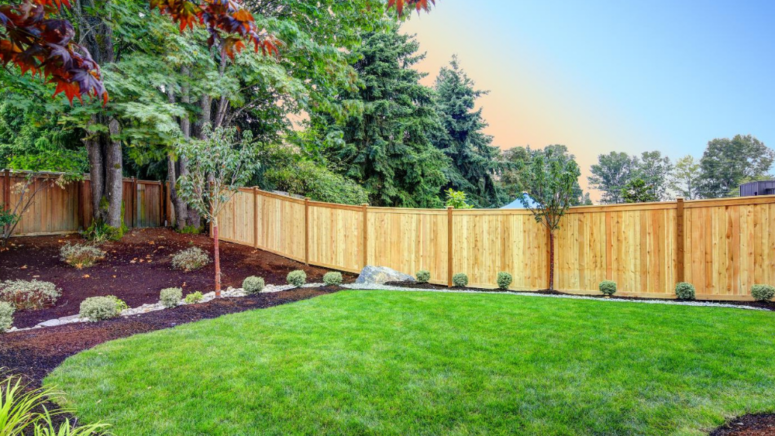Does a Fence Increase Home Value, Or Is It Just Good for Pets and Privacy?
- Published on
- 6 min read
-
 Erika Riley, Contributing AuthorClose
Erika Riley, Contributing AuthorClose Erika Riley Contributing Author
Erika Riley Contributing AuthorErika Riley is a journalist who has written about home design and real estate in a variety of outlets primarily in New York City. Now based in the D.C. Metro area, Erika enjoys painting her furniture too many times and finding the prettiest townhouses to walk by.
-
 Richard Haddad, Executive EditorClose
Richard Haddad, Executive EditorClose Richard Haddad Executive Editor
Richard Haddad Executive EditorRichard Haddad is the executive editor of HomeLight.com. He works with an experienced content team that oversees the company’s blog featuring in-depth articles about the home buying and selling process, homeownership news, home care and design tips, and related real estate trends. Previously, he served as an editor and content producer for World Company, Gannett, and Western News & Info, where he also served as news director and director of internet operations.
Top real estate professionals who price dozens of homes a year will tell you a new fence comes with no guarantee of return on investment when the owner goes to sell. But to answer the question, “Does a fence increase home value?” you’ll need to consider many factors that may come into play.
The fence’s value boost depends on the materials you use, your neighborhood, the features local buyers look for, and the property’s condition.
According to HomeLight’s Top Agent Insights for Spring 2023, real estate professionals estimate that a landscaping upgrade adds $7,312 in value and lets you recoup 212% of costs. Landscaping includes fencing, which can tie the entire outdoor space together and give it a more manicured appearance.
A beautiful front yard fence frames a home and adds curb appeal. Tall backyard fences can inspire buyers with furry friends to make an offer. But then again, the question remains: can a fence alone boost your home value?
Here, we break down how a fence can impact your home sale and how to install one.
How much does it cost to build a fence?
Constructing a fence isn’t cheap. As of 2024, installing a new one costs between $1,800 and $4,700.
The factors that can impact the cost of your fence include:
- The length of your fence perimeter (measured in linear feet)
- The type and material of your fence
- Any necessary permits from your city or county
- If you hire a professional or DIY
The costs of your fence materials could range between $2 and $90 per linear foot, and the average backyard perimeter is 150-170 linear feet. Front yards are typically smaller.
You’ll also want to think about how high you want your fence to be. Front yard fences are typically 3 feet high, while backyard fences are on the taller end, ranging from 6 to 8 feet.
The pros and cons of different fencing materials
There are several materials to choose from when building your fence. The least expensive options are least likely to increase value or curb appeal.
Consider the following, priced low to high:
- Wood: Moderately priced and suitable for privacy
- Vinyl: Expensive, decorative, and low-maintenance
- Aluminum: Expensive and low-maintenance
- Wrought iron: Expensive, decorative, and higher maintenance
Classic wood and vinyl are the top picks of real estate agent Sue Goodhart, with 32 years of experience in the Alexandria, Virginia, area. “Plastic white-picket fences are popular because of (the maintenance factor),” says Goodhart. Many white picket fences are vinyl, requiring no maintenance besides the occasional hose down.
Your location and local climate can also impact your decision. Your fence can take a beating from heavy rain, wind, and snow. Wrought iron is the most durable, but you must treat it regularly to help prevent rust. Aluminum looks similar to wrought iron and requires less maintenance. However, it’s not quite as durable.
If your top priority is privacy, then you can’t beat the classic and functional simplicity of wood.
What do you need to do before getting a fence installed?
Before you start building, you need to know your property lines. To find them, use your home’s plat (the map of your plot of land and boundaries). If you don’t have it, head to the county assessor’s office or call a land surveyor to get the correct measurements.
Goodhart has seen several cases where a fence is in the wrong location, which can cause issues when it comes time to sell. If your fence is off your property line, it gives buyers a false impression of where their future property ends and begins and may create difficulties or worse with neighbors who feel encroached on. Additionally, you’ll need to build around any lines for gas, electricity, water, or cable.
HomeAdvisor recommends getting your utilities company to come out to inspect wherever you plan to build. They should also check for tree roots and survey your yard. Steep hills, rocky soil, and other existing structures make the job more complicated and costly.
How to hire a qualified fence installer you can trust
Unless you’re ready to take on a complex DIY job, you’ll want to hire a professional for your fence job. A professional can help ensure your fence provides the curb appeal you’re seeking.
To find a qualified, trusted fence installer, ask your real estate agent if they have anyone in their network they’d vouch for. If you’re selling your home without a realtor or simply not looking to sell, see if you can get a referral from one of your neighbors.
Looking at online reviews and references is also important in performing due diligence. Be sure to meet and interview a few installers and ask how their previous experience relates to your unique fencing needs.
Fence in bad shape? The case for fixing it before you list
While Goodhart wouldn’t encourage homeowners to add a new fence solely to sell their home, she would encourage them to fix their fence before listing if it’s not in the best shape.
If it’s a wooden picket fence, “it should be painted, looking fresh and well taken care of,” Goodhart adds. “If it’s damaged, broken or leaning, or if the wood is rotting,” it may be time to repair your fence.
Additionally, if your fence is dated or out of style, or does not fit the general aesthetic of your neighborhood, consider removing it, even if you don’t end up replacing it.
For chain-link fencing, Goodhart advises that “chain-link fencing is not very attractive, so I will just ask people to pull it down. If you don’t want to spend the money to replace a chain link fence, then just remove it.”
You can also consider removing a fence if it blocks a view.
Regarding repairs, be realistic about what you can fix yourself. If your fence is leaning, damaged, or broken, it’s best to call a fence professional to restore it to its once-pristine condition.
What do buyers want in a fence?
A good fence provides privacy and protection and improves curb appeal and aesthetics. When asked why her homebuyers look for fences when house hunting, Goodhart said keeping pets and children contained and safe is paramount.
“The no. 1 reason I find is if they have dogs,” Goodhart says. Private outdoor spaces are especially important to dog owners when house-searching. This is especially true if the home is situated on or near a busy street.
Privacy is also high on many homebuyers’ lists of “wants.” In more urban areas, privacy fences are popular. Homebuyers like to picture themselves relaxing in the backyard without anyone peeking in. They’re also popular in neighborhoods or cities with smaller lots, where fences can create more private space.
Will a fence increase your home’s value?
A fence is no small project. And if it’s not going to directly add value to your property before you sell, you’re better off improving the inside of the home or your landscaping in more tangible ways.
That’s not to say that well-maintained fences aren’t worth something. As a homeowner, you may enjoy the perks of having a fence, which can create a private oasis perfect for letting your pets run free. A charming fence around your home also wins instant curb appeal bonus points.
An appraiser who evaluates your house during the sale will look at the fence and either add or subtract value based on its condition and what buyers in the area are looking for. In many instances, Goodhart says, letting the buyer choose whether or not they want to add their own fence is a safer bet than making the investment.
“I don’t know that a fence is a value-add,” Goodhart says. “But I think all staging and renovations, whenever you are improving the house, is going to [help your home] sell faster.”
Header Image Source: (Artazum / Shutterstock)






